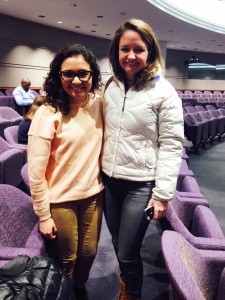On February 10, 2014 at 10:30 in the morning, the Hartford Education Committee held their first meeting of the 2014 session at the Legislative Office Building of the Hartford General Assembly. Room 2C was filled with an audience of people in amphitheater style seating, interested and perhaps even passionate about reforming the Connecticut education system. The audience seemed prepared to devote a considerable amount of time to the meeting, as many were dressed in suits, ready to take notes on laptops and in notebooks. Both of us were excited to witness discussion about the many issues existing in Connecticut schools today. Having never attended an education committee meeting before, we expected a lengthy and thoughtful deliberation that would illustrate the direction education reform would take in the coming year.
Senator Andrea L. Stillman opened the meeting by welcoming everyone to the new session. She introduced other committee chairs, who all seemed eager to make progress in the new term. Representative Andrew Fleischmann remarked that he was especially enthusiastic to address the issues of reforming pre-schools and increasing safety in schools. He declared another worthy goal the committee had: “we want to do good while keeping the number of bills short”.
Senator Stillman addressed Section III of the meeting agenda schedule, titled “Committee Concepts to be Raised”, stating that these were all issues to be discussed at future meetings. Section III lists several issues: special education, magnet schools, collaboration between boards of education and school resource officers, authorization of state grant commitments for school building projects, and social media education. Having yet to formalize most of these into a bill, Stillman suggested, “don’t try to look up these bills because there is no language for them yet.” There was a collective response from the audience in favor of reviewing these topics at future meetings, and with that the meeting concluded.
Initially when Stillman called recess, it seemed logical to assume that the meeting was taking a short break, and that conversation would once again resume. Some members remained seated, engaging in small-talk with one another, while others rushed out of the room. We waited for about five minutes expecting a sign that the meeting was going to recommence. Finally, we got the courage to ask another member of the audience if the meeting was still going. The man we asked told us that the meeting was in fact over, and that the purpose of it was to simply vote that the concepts raised would be discussed in greater detail in the future. These concepts would eventually take form in a bill. However, there was still no decided time and date for the next meeting.
Leaving the meeting, we were shocked at the outcome and lack of effectiveness that took place. There are clearly many issues with the Connecticut education system, and we expected this meeting to address some of them. In addition to the many concepts to be raised, there were three previously raised governors bills on the agenda. It is not surprising that these issues will not be resolved, or that they will take a long time to be resolved because of the nature of the legislative process that we witnessed before our eyes. If our government continues to treat major issues, such as education reform, with such insignificance and lightness, progress in creating policy will inevitably be absent.
Similarly, we were surprised by the tardiness of the people attending the meeting and the tardiness of the meeting itself which started ten minutes late. Because this was such a formal assembly with senators and representatives, we expected promptness and efficiency. Neither of us could believe that people took time out of their schedules for what seemed like such a disorganized and unproductive gathering that only lasted about twenty minutes.
Even while the meeting was taking place, the comments that were made by senators and representatives lacked substance. Those in attendance introduced themselves and spoke only of how excited they were to reconvene in session. These were nice remarks, however they were redundant and neglected to articulate the key issues at hand. One would expect these powerful voices to have more to say regarding some of the most prominent issues in our society. It felt as if we were sitting in a high school class, where a student would makes a comment, and three more students paraphrased the same concept simply to gain participation points. We were truly disappointed by the lack of originality and value in their words.
Ultimately, the outcome of this meeting was disappointing. Our expectations for quality conversation and strong voices receded quickly. However, observing this event allowed us to understand the inner workings of today’s legislative process in a way that highlights their flaws and truly depicts why education reform is a complicated, cluttered, and slow-moving process.

Photo Credit: Christina Raiti
Isabel Monteleone is a student at Trinity College ‘16, majoring in Public Policy and Law
Emily Meehan is a student at Trinity College ‘16, majoring in Educational Studies